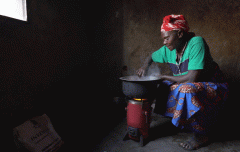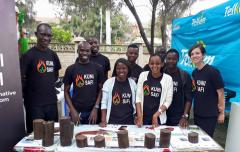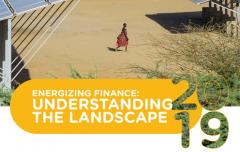Divine Bamboo creating local market for clean cooking in Uganda
In a series of stories, we are profiling the four winners of the 2020 Energy Access Booster Award, offered to entrepreneurs operating in Africa and Asia, with a focus on two sectors: clean cooking and waste-to-energy. The awards are sponsored by TOTAL, ENEA Consulting, Acumen and Sustainable Energy for All (SEforALL).
Highlights
Divine Nabaweesi doesn’t need statistics to tell her that her country suffers from a lack of clean cooking options.
Never mind that Tracking SDG7: The Energy Progress Report 2019 identified Uganda as among 20 countries worldwide with the largest access deficits for clean cooking, with less than 5 percent of the population using clean fuels and technologies as their primary means of cooking.
Uganda’s clean cooking problem has been all too apparent to Nabaweesi since she was a child. “Growing up in a small village in rural Uganda, I witnessed first-hand the perils of cooking with ‘unclean’ fuels like firewood that African women face daily,” she says.
Among these perils were the negative health effects from exposure to fumes from burning firewood—consequences that disproportionately affect women—and the widespread deforestation of the natural environment Nabaweesi cherished.
First-hand experience drove Nabaweesi to found Divine Bamboo, a social enterprise with a mission to stop deforestation in Uganda through the promotion of fast-growing local bamboo species to produce clean cooking fuel in the form of bamboo-based briquettes.
“I learned about the numerous uses of bamboo which is indigenous to Uganda and realized that bamboo can be transformed into both charcoal and briquettes that would be an affordable and clean cooking alternative,” she says.
Bamboo is a fast-growing, annually yielding and self-regenerating biomass, making it an ecologically sustainable alternative to tree biomass from natural forests, Nabaweesi explains. Cultivated bamboo can then be processed and converted into briquettes that have a higher calorific value than traditional charcoal and firewood.
Nabaweesi says that Divine Bamboo’s briquettes have been tested and proven to have technically competitive heating properties by the Centre for Research in Energy Efficiency and Conservation. The higher efficiency of bamboo briquettes means Divine Bamboo’s product has the potential to reduce household fuel expenditure by 50 percent compared to traditional charcoal (USD 0.32 per kilogram for bamboo briquettes versus USD 0.64 for charcoal). The briquettes also produce less soot and smoke compared to charcoal and firewood, alleviating negative health and respiratory effects on people.
Since its inception in 2016, Divine Bamboo has become the largest producer of bamboo seedlings in Uganda with a capacity of 400,000 seedlings annually. It has planted approximately 25 hectares of bamboo while working with local farmers and individual tree growers to establish a bamboo briquette value chain that contributes to local economic development.
“We have trained 350 small-scale farmers, mainly women and youth, about the establishment of bamboo plantations and production of bamboo briquettes,” Nabaweesi explains. “We shared knowledge with them on how to grow bamboo as an agro-forestry crop alongside their already existing crops.”
The combination of social, environmental and economic benefits that Divine Bamboo offers through its bamboo briquette value chain was the reason it was recently selected for an Energy Access Booster Award.
Divine Bamboo applied for the award—which offers up to USD 50,000 in financial support as well as strategic business consulting—so that it can reach commercial scale for producing its briquettes. After being selected as one of four award recipients, Nabaweesi says the company will be able to “scale production to four tonnes of briquettes per month by acquiring automated production equipment and hiring additional technical staff.”
By reaching commercial scale with its production capabilities, Divine Bamboo will increase demand for local bamboo, giving farmers new opportunities to supply a sought-after crop, thereby creating jobs. Meanwhile, the farmers’ crops will be converted to a consumer product that ultimately benefits local people as a cheaper and cleaner cooking solution, as well as the environment by curbing deforestation.
Therefore, the Energy Access Booster Award will help Divine Bamboo achieve its five-year goals of reducing charcoal and firewood consumption from unsustainable sources by 20 percent in Kampala, employing at least 300 people directly and indirectly, and training a further 250 people in the entire bamboo briquette value chain.
These will be important steps towards creating new markets for clean fuels and technologies in Uganda, which are needed for approximately 42 million people who currently have no access to clean cooking.
Related content

Opinion
16 Apr 2020

SDG7 News
26 Mar 2020

SDG7 News
06 Dec 2019

Research
22 Oct 2019
